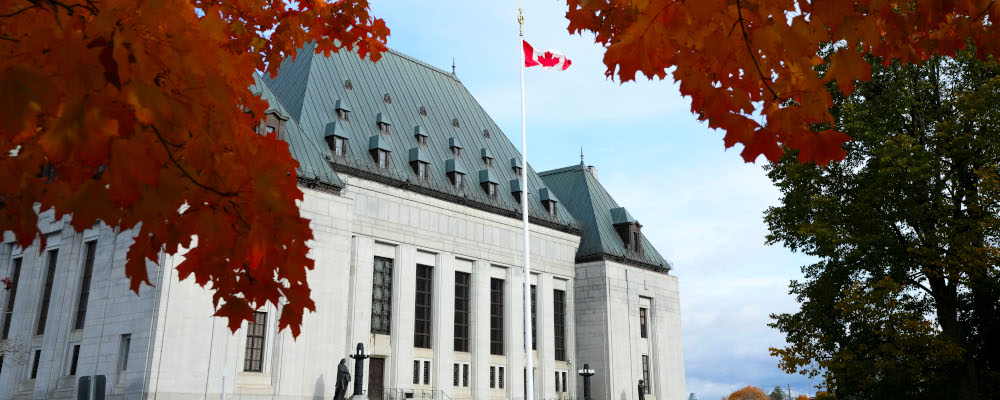Constitutionalism remains among the most unexplored of Canada’s core constitutional principles. Though identified as such in the 1998 Secession Reference, the Supreme Court of Canada has said relatively little about the actual substance of this principle, apart from noting that constitutionalism “requires that all government action comply with the Constitution.”
Thankfully, a movement is stirring among Canadian jurists to rigorously understand and faithfully apply the principle of constitutionalism. For instance, Justice Malcolm Rowe of the Supreme Court delivered a timely defence of the role that constitutionalism plays in a free and democratic society in a keynote address at the close of the Runnymede Society’s recent Law & Freedom conference, an excerpt from which was exclusively republished by The Hub.
Not everyone, however, seems to appreciate the importance or content of this principle. Columnist Andrew Coyne, responding to Justice Rowe’s lecture, conflates concern “that ‘unelected judges’ are undoing the work of elected parliamentarians” with conservative ideology. But his reply misapprehends the essence of constitutionalism. Coyne describes the Runnymede Society as “a conservative legal group” because its members are ecumenically committed to this principle. It’s an imperfect label, at best.
There are certainly similarities between constitutionalism and conservatism. Indeed, many conservatives are naturally inclined to adopt a constitutionalist outlook. Both conservatism and constitutionalism tend to be defined by a non-utopian realism. For conservatives, this means adopting laws and policies that respond to the world as it is. For constitutionalists, this means faithfully upholding our constitutional settlement as we find it, rather than as we might wish it had been framed.
Yet it would be a mistake to conclude that because a lawyer or law student identifies as a constitutionalist that they must also necessarily identify as a conservative—even while it’s conversely difficult to see how conservatives could reject the tenets of constitutionalism. It is no secret that conservatives are an important and sizable constituency within the Runnymede Society, which seeks to create a forum where important issues relating to constitutionalism and the rule of law can be openly discussed. But conservatives do not exclusively make up our society’s membership, which also consists of classical liberals, libertarians, and heterodox leftists dissatisfied with the general lack of intellectual diversity within the Canadian legal academy and profession.
An argument can thus be made that constitutionalism is not an ideology, per se, but rather a general outlook and disposition that can be oriented toward different ideological ends, depending on the context. Constitutionalism is governed by two core dispositional commitments. First, to broadly supporting the tenets of one’s respective constitutional settlement. And second, to ensuring that this settlement is faithfully upheld, specifically by ensuring that the legal instruments which attest to this constitutional reality are rigorously and objectively interpreted.
In Canada, two corresponding objections to constitutionalism have arisen in recent years. The first is perhaps the most obvious, which is to simply reject the Canadian Constitution outright as an “instrument of repression,” as Justice Rowe put it in his lecture. If nothing else, this objection has the benefit of being more intellectually transparent, since it seeks to discredit Canada’s constitutional settlement on a foundational level: to put it bluntly, if you declare at the outset that the Canadian Constitution is itself a bad thing, you’re far less likely to be concerned with whether it’s faithfully interpreted and applied.
The second objection to constitutionalism is stealthier since it’s rarely framed as an objection. While purporting to uphold Canada’s constitutional settlement, it sees the Constitution as a screen onto which policy preferences are subjectively projected, rather than a legal instrument from which objective meaning is derived. Proponents of this view are largely disinterested in the constitutionalist’s regard for faithful legal interpretation. While quick to describe the Constitution as a “living tree capable of growth and expansion,” they often neglect to include the latter half of this now-famous quote from the Privy Council’s 1929 ruling in Edwards v Canada, that such growth and expansion occurs “within its natural limits.”

Such was the dissenting opinion in the Supreme Court’s 2021 ruling in Toronto v Ontario, which suggested that courts may invalidate laws for violating the Constitution’s “basic constitutional structure”, even when they’re not actually offside “any express constitutional provision.” A majority of the justices in that decision (including Justice Rowe) instead ruled that, “[I]t is inconceivable that legislation which is repugnant to our ‘basic constitutional structure’ would not infringe the Constitution itself,” precisely because “[t]he structure of our Constitution is identified by way of its actual provisions, recorded in its text.”
To be sure, none of this means (as Coyne implies) that constitutionalists are inherently opposed to the idea of judicial authority—so long as this authority is exercised within the boundaries set by the Constitution itself. On this point, Coyne is correct insofar as he notes that judicial review of legislation is not an innovation that arose with the adoption of the Canadian Charter of Rights and Freedoms in 1982. Since Confederation, Canadian courts have possessed a sovereign authority to invalidate laws that contravene the provisions of the Constitution.
Likewise, this is not to suggest that constitutionalists never diverge in their understanding of the Constitution’s content, nor that they might not change aspects of their constitutional settlement if given the chance. What unites all constitutionalists is their commitment to reform within the boundaries set by the Constitution itself, rather than by looking to courts to assume an authority they do not rightly possess, when their preferred legislative reforms fail. In other words, ours is ultimately a settlement not of legislative or judicial supremacy, but of constitutional supremacy. Falsely conflating constitutionalism with conservatism undermines this reality.
Recommended for You

Peter Menzies: Justin Trudeau’s legislative legacy is still haunting the Liberals

Ian Holloway: The Supreme Court is ditching its iconic red robes. Yes, it matters

Michael Geist: The government’s stunning new assault on Canadians’ privacy

Ginny Roth: The Hockey Canada trial exposes our bereft sexual ethics





